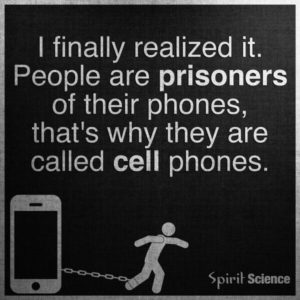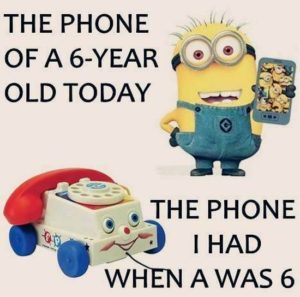Approximately one of two months is spent off the grid every summer, without cell phone coverage. If we’ve been there before, we usually know whether we will have access, but often times, we don’t have any idea if we will be able to contact friends and relatives, or if we will be turned off to the cyber world around us. In some ways, it is difficult, while in others, it’s a welcome mandated retreat. When we crossed the country on bikes in 2003, we had no cell phones and sometimes lost contact with mom in her support vehicle. Our method of contact was to call dad back home and the second person who called would be alerted about where the first was. Inconvenient? Definitely. In so many ways though, it really was refreshing. I’d like to think that living through that inconvenience only gave us a greater appreciation for the convenience of having such easy access now. It’s amazing how much has changed since that time. Now, the cell phone has become what a pager once was and more. Our 11 year old (and even 9 year old) son is definitely in the minority… he does not yet have a cell phone.
“I had to buy one to keep my child safer,” is commonly a sentence I hear. I struggle with this topic more than any other. The cell phone is slowly creeping into our children’s lives. We represent the 20% of families that didn’t allow our 11 year old to have a cell phone… yet. There are times when he is hours away for a weekend campout with scouts or a cross country meet. It has been hard to adjust to the distance with no way to contact him, and it is tempting at times to succumb to the pressure. He is expected to text us to keep us updated or tell us when to pick him up. In these instances, he has to use a teammate or coaches phone to get in touch with us.
So, how did we decide to tackle this one? Ethan will earn one after he reads the 100 books (of our choosing) on his list. Already 50 books into this challenge, we are shocked to find one of the most intense and highly motivated efforts ever witnessed by such a young man. We have started to observe and react to how much the cell phone is used, realizing just how close he may be to receiving a phone. There are a few topics I react to, including phones being used as a personal diary, phones used to watch countless hours of YouTube and game playing, and phones that allow access into a dark world, whether intentions were innocent or not.
First, I want to point out that phones are generally an amazingly awesome tool that leave me jealous. I cannot believe children can walk around with a super complex Atari system. I also have a hard time imagining life without a cell phone. In addition, there is no judgment on other parents for the reasons they have or have not decided their child needs one.
However, with my respect and admiration towards this cool tool comes the extreme caution I will take giving a device to my children. At the age of 11, he does not have the self control to moderate. We have strict rules in our home to earn iPad time on weekends. Like many children his age, he can be quickly seduced to countless hours of playing games on his iPad. His addiction causes him to lie about how much time he has spent on the device or his intentions with using the device. Over the years, I have observed unprecedented mood swings in children when they use cell phones. Like an alcoholic without a drink for a day, kids can become intolerable without their phones. This leaves parents and children in an awkward position. How much independence should parents give children? Should children be allowed to treat their phones as their diary? I am surprised to see kids become so private with a device that was originally granted to them to keep them safer.
As parents of 5 children, we have recently started a policy that all cell phones stay on the kitchen counter when guests enter our home. Even as adults, we have a hard time moderating, and have done our best to participate in our new rule. Not only do I not trust my children from predators on the internet, I certainly do not trust the discretion teenagers have towards using their devices with my children near them. As a teacher, I encourage groups of children to openly talk to one another without keeping secrets. In an art classroom, this is a pretty reasonable expectation. However, I have already observed phones that are kept privately, where kids are found with a dull glow of a cell screen texting…This is troubling to me. The phrase “Carpe Diem” when applied can mean our children are taught to enjoy the moments they have with the people they are with. I understand how quickly this device can be used as a crutch. In line checking out groceries and the line is long and slow, maybe I will take the cell phone out to see if there are any hits on the most recent posted picture on Instagram. This time can always be used to connect with other people.
The cell phone allows unusual access into others lives and moments. YouTube is one of the most powerful engines on the internet. Like using Siri, a quick search on YouTube can help us build things, watch clips from our favorite shows, and gain perspectives on places we can visit. These are incredible helpful reasons to use the internet. On the other hand, YouTube can lead to crazy unrealistic expectations.
Did you ever noticed how your favorite 1980s PG movie just became a PG-13 movie over night? Several movies have countless material which would not be considered politically correct today. Swear words and partial nudity are not uncommon. I cringed watching Ghost Busters with my children years ago. So I cringe now to think that a simple push of the touch screen can access much harsher material with ease. Similar to cigarette ads reaching us in our youth, sexual content seemingly has no age limit today. This should absolutely scare us. It strikes me that we teach sex education to 10 year olds but also hand devices over to children capable of allowing unlimited access. I’m confused… I’ve sat through countless talks and witnessed 80 to 100 boys uncomfortably sit through a 90 minute presentation. They ask innocent questions and feel completely ashamed. It only takes a few inappropriate images with a cell phone to cause irreversible damage and take innocence away. I feel that parents should use every opportunity to monitor every bit of information used on our children’s cell phones.
I know we will do everything in our power to protect our children. Despite its many benefits, the cell phone is one of the single most dangerous tools our children can have. If it is not monitored using extreme measures, it can lead to an end of innocence and worse. During a paternity leave, I stood at the bus stop and counted the drivers using cell phones. Countless drivers passed a bus stop looking at their phones as they drove by. Car accidents due to texting has results in way too many injuries and fatalities.
Recently, some friends went out shopping for their oldest daughter to get a cell phone. She couldn’t wait to see what they would bring home. They arrived home with a Gizmo, a watch-like device that allows their daughter to call or text the few people on her short list. This device serves the exact purpose we all NEED our children to have a phone. Of course, she was devastated. I can’t be certain what direction we go until we are there, but I wouldn’t be surprised if this is what we come home with too.
We realize that enforcing kids who have a phone to leave it on our counter is a harsh stance that may discourage some from visiting our home, but this was the best way we could stay on top of the issue for now. After observing many teens and pre-teens engage in lots of unsupervised time on their devices (feeling powerless to know whether that was their parents wishes or not), and others actually breaking devices at our house, we feel this is the best solution for us. While they may not have immediate access to others outside our home, we can assure everyone that there will be lots of fun, and REAL communication while you are with us.


3 Responses to Communication at its Best and Worst